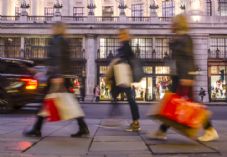UK DIY News
Barclays: Card Spending Declined During September

- Consumers’ confidence in their ability to live within their means reached a four-year high at 78 per cent and confidence in personal finances remained resilient
- Almost half are making changes to their personal finances in anticipation of the Autumn Budget, with one in three of this group building a savings buffer
- Public transport saw its greatest decline since March 2021 due to widespread strikes, contributing to in-person sales dipping -1.6 per cent
- Clothing marked eight months of consecutive growth and streaming climbed 3.9 per cent, amid the success of hit shows House of Guinness and The Summer I Turned Pretty
- The Barclays Consumer Spend report combines hundreds of millions of customer transactions with consumer research to provide an in-depth view of UK spending
Consumer card spending declined -0.7 per cent year-on-year in September, down from 0.5 per cent growth in August and lower than the latest CPIH inflation rate of 4.1 per cent. Essential spending fell -2.6 per cent, while growth in discretionary spending slowed to 0.2 per cent. Clothing, furniture and beauty all had strong months, however, as affordable, ‘pick-me-up’ purchases were prioritised amid wider cutbacks.
Following an uplift in August, consumer confidence in the strength of the UK, European and global economy all fell in September, to 25 per cent, 29 per cent and 26 per cent respectively (down from 28 per cent, 31 per cent and 28 per cent).
Consumers’ confidence in their ability to live within their means, however, reached its highest level in over four years, at 78 per cent, while confidence in household finances climbed to 74 per cent – a seven-month high. This comes as almost half of UK adults (44 per cent) say they are making changes to their personal finances in anticipation of November’s Autumn Budget, with a third (35 per cent) of this group building a savings buffer.
Balancing budgets while finding room for treats
Essential spending declined (-2.6 per cent) for the fifth consecutive month in September, while two in three (64 per cent) say they are trying to spend less on groceries. Growth in discretionary spending reached a 15-month low, up just 0.2 per cent year-on-year. This trend looks likely to continue, as almost half (46 per cent) of consumers say they are planning to reduce non-essential costs.
Despite broader cutbacks, multiple non-essential categories benefited from ‘pick-me-up’ purchases. Furniture enjoyed its tenth consecutive month of growth, up 7.5 per cent, while pharmacy, health & beauty saw a strong performance once again (up 9.0 per cent). Clothing stores, up 2.1 per cent, marked eight months of year-on-year growth, as 20 per cent of shoppers reported spending more on clothes, shoes and accessories in September.
Ahead of retail’s ‘golden quarter’, one in four (23 per cent) have already made a start on their festive shopping, buying gifts early to spread out costs, while three in 10 (27 per cent) put aside money in September to spend in the seasonal sales.
Amid the rise of ‘kidulting’, which sees adults increasingly embracing hobbies and products once designed for children, one in ten (11 per cent) have purchased a game, video game, toy or collectible for themselves or another adult in the last year. One in five (17 per cent) believe playing with toys and games is good for stress relief and escapism, and 16 per cent see it as a positive alternative to screen time. In terms of these adults’ most purchased toys, 53 per cent bought a video game, followed by board games and jigsaws (24 per cent), Lego (22 per cent) and arts and crafts (21 per cent).
Public transport slows amid London strikes
Spending on public transport saw its greatest decline since March 2021 in September, down -2.6 per cent, following widespread transport strikes. Over one in three (36 per cent) Londoners said strike action reduced their monthly outgoings, with the biggest savings made on office food or lunches (£29 less), eating out (£29 less) and non-food retail (£26 less). Overall, face-to-face spending decreased -1.6 per cent across the UK – its greatest fall since June 2024.
The travel category saw marginal annual growth of 0.8 per cent in September, below August’s 3.1 per cent. Within this, travel agents saw the strongest performance, up 4.2 per cent, however hotel spending (-2.2 per cent) dipped for the first time since July 2024 and airlines (-4.3 per cent) declined for the first time in over four years. Looking ahead, 38 per cent of those planning to cut non-essential spending say they will spend less on holidays abroad.
Streaming excels once again
Spending on ‘insperiences’ (at-home experiences) rose 2.7 per cent in September, while digital content and subscriptions grew 3.9 per cent year-on-year, helped by popular series such as The Summer I Turned Pretty, House of Guinness and The Girlfriend.
Takeaways, however, dipped -0.6 per cent in September, as 53 per cent of those looking to reduce discretionary outgoings intend to spend less ordering meals “on-demand”. Of those treating themselves even when on a budget, a quarter (24 per cent) are opting to buy ingredients to make home-made treats, which likely contributed to the 1.5 per cent growth in food and drink specialist stores.
Karen Johnson, Head of Retail at Barclays, said: “It is encouraging to see that UK consumers feel confident in their ability to manage their budgets, amid ongoing cost of living concerns. We’re continuing to see cautious spending, and shoppers are consistently seeking out areas they can cut back on. However, multiple retail categories have proven to be resilient in recent months, with furniture, clothing, and beauty all remaining in growth since February of this year.”
Julien Lafargue, Chief Market Strategist, Barclays Private Bank and Wealth Management, said: “Although spending habits keep evolving, the UK consumer remains resilient in the face of an uncertain macroeconomic backdrop. With wage growth continuing to outpace inflation, there is room for spending to accelerate again when visibility improves.”
2025 consumer confidence measures
| Jan | Feb | Mar | Apr | May | Jun | Jul | Aug | Sep |
Household finances | 70% | 75% | 70% | 70% | 67% | 73% | 72% | 73% | 74% |
Job security | 47% | 48% | 46% | 48% | 47% | 50% | 48% | 48% | 47% |
Non-essential spending | 56% | 59% | 58% | 60% | 56% | 59% | 58% | 60% | 60% |
Ability to live within means | 74% | 77% | 73% | 74% | 74% | 76% | 75% | 77% | 78% |
Strength of UK economy | 21% | 25% | 23% | 24% | 28% | 25% | 22% | 28% | 25% |
Strength of European economy | 25% | 28% | 30% | 27% | 30% | 27% | 25% | 31% | 29% |
Strength of global economy | 21% | 26% | 24% | 21% | 26% | 23% | 21% | 28% | 26% |
Overall growth figures
Spend Growth | Transaction Growth | |
Essential | -2.6% | -4.3% |
Non Essential | 0.2% | -0.8% |
|
| |
OVERALL | -0.7% | -2.2% |
Retail | -0.1% | -1.6% |
Clothing | 2.1% | 3.1% |
Grocery | -1.7% | -3.0% |
| -2.1% | -4.8% |
| 1.5% | 5.7% |
Household | -0.1% | 1.6% |
| -2.4% | -6.6% |
| -3.6% | 7.9% |
| 7.5% | 3.9% |
| 2.9% | 0.7% |
General Retailers | -0.5% | -0.4% |
| 1.8% | 1.6% |
| -6.2% | -2.4% |
| -5.8% | -6.3% |
Specialist Retailers | 4.2% | -1.6% |
| 9.0% | -0.6% |
| -3.4% | -3.2% |
| 3.5% | -2.4% |
Hospitality & Leisure | 0.4% | -2.9% |
Digital Content & Subscription | 3.9% | 2.1% |
Eating & Drinking | 0.1% | -4.1% |
| 0.8% | -2.4% |
| -0.5% | -2.0% |
| -0.6% | -7.4% |
Entertainment | -0.3% | 2.3% |
Hotels, Resorts & Accommodation | -2.2% | -6.0% |
Travel | 0.8% | -5.6% |
| 4.2% | 18.1% |
| -4.3% | -8.6% |
| -2.6% | -11.3% |
| 3.7% | 4.3% |
Other | -3.9% | -2.2% |
Fuel | -7.2% | -6.4% |
Motoring | -4.1% | 3.6% |
Other Services | -2.2% | -1.2% |
Insperiences | 2.7% | -2.2% |
|
|
|
Online | 0.4% | 2.0% |
Face-to-Face | -1.6% | -3.9% |
Source : Barclays
Image : Cunaplus_M.Faba / iStock / 1087671624
Insight DIY always publishes the latest news stories before anyone else and we find it to be an invaluable source of customer and market information.











































